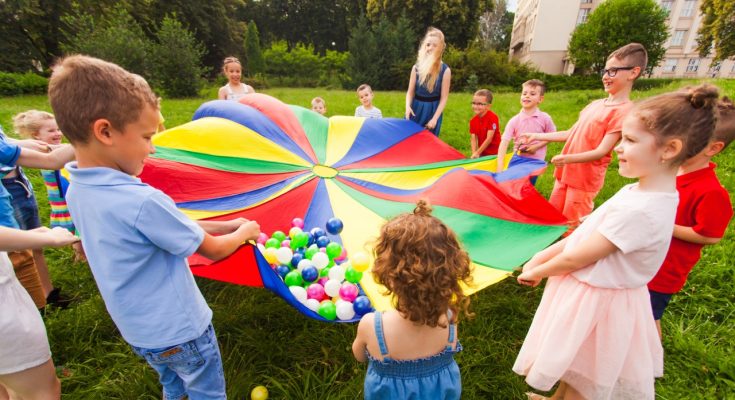Playing outdoors has always been an integral part of growing up, and it is just the right combination of play and education. In this day and age of screens and interior pursuits, there is no overemphasis on obtaining oneself outside in the wild. Playing outdoors is not just fun, it is the foundation for physical, cognitive, emotional and social growth. We will explore how outdoor play is important for your child’s development.
1. Boosts Physical Health
Play in the outdoors keeps kids moving, jumping, running, climbing and helps them fall in love with movement. These activities:
- Improve cardiovascular health.
- Strengthen muscles and bones.
- Improve balance, coordination, and coordination.
Sunlight also increases the production of vitamin D, which is important for bone and immune health. In contrast to organised indoor play, outdoor chaos forces children to learn and adapt, forming their body as resilient as it can.
2. Enhances Mental Well-being
Children find playing outdoors to reduce stress and anxiety. Research has found that a life spent in green spaces can:
- Lower cortisol levels.
- Improve attention spans.
- Reduce symptoms of ADHD.
Outdoor play inspires imagination and wonder because children have access to a live environment that excites their senses. Creativity and creative problem-solving can be encouraged by constructing a fort, observing insects, or even simply sensing the wind.
3. Promotes Social Development
Playing outdoors typically involves play with others, thereby developing social skills such as cooperation, communication and conflict resolution. Social games such as tag or sandcastles help children:
- Share and take turns.
- You should collaborate.
- Negotiate and handle disagreements.
They are the tools they need to develop healthy relationships and to navigate social interactions as they develop.
4. Encourages Risk-Taking and Resilience
The openness of outdoor play lets children experiment in a safe way. Whether it’s a tree climb, a swing jump or a bike ride, these experiences empower children:
- Assess risks and make decisions.
- Build confidence in their abilities.
- Learn from their failures.
They teach us perseverance and grit, the keys to success in later life.
5. Nurtures a Connection with Nature
In an increasingly denatured world, outdoor play nurtures nature awareness. Going hiking, gardening, or walking in a park:
- Develop environmental awareness.
- Be a responsible citizen of the world.
- Be curious about nature, animals, and ecology.
Those children who are exposed to nature value it more and become better stewards of the natural world.
6. Improves Cognitive Skills
Outdoor play allows students a hands-on way of learning that isn’t usually available in classrooms. Building, exploring or experimenting in the wilderness:
- Stimulate critical thinking and creativity.
- Increased spatial and problem-solving skills.
- Enhance memory and observational skills.
Observing leaf-patterns, for example, or making estimations of distance, or learning to follow a path, are all cognitive processes characteristic of outdoor play.
7. Fosters Emotional Development
Outdoor play is about autonomy. When children are out of the regimented routines of school or home, they have the opportunity to choose for themselves, which gives them a sense of self-worth. Moreover, the sensory stimulation of nature inspires all sorts of wonder, happiness, and even frustration in children:
- Develop emotional intelligence.
- Create strategies for dealing with stress or disappointment.
- Embrace compassion for other humans and other living beings.
8. Combats Screen Addiction
Children spend more time indoors, and this results in low levels of physical activity, poor posture and social isolation, as digital devices proliferate. Play in nature is a natural replacement for screen addiction:
- Engaging alternatives to passive entertainment.
- There is an opportunity to experiment and develop.
- Fitness activities that boost wellness.
Teaching children to move away from the screen and engage with nature helps them live healthier lives and cultivate an active connection with nature.
9. Builds the Foundation for Lifelong Practices.
Kids who were exposed to outdoor play tended to retain lifetime patterns of physical engagement and curiosity. These habits:
- Minimize obesity and other medical conditions.
- Give up something you love to do like hiking, biking or gardening.
- Adopt a positive attitude towards health and wellness.
The outdoor passion that begins in childhood is often sustained well into adulthood and reflects a healthy, well-lived life.
10. Here are Some Handy Tips For Outdoor Play.
If you want outdoor play to be a regular part of your child’s life, follow these guidelines:
Design a safe playground: Make sure your backyard or local park is not filled with dangers.
Plan for play outside: Give yourself at least 30–60 minutes of outdoor play every day.
Provide adaptable tools: Use objects such as balls, jump ropes, or chalk to stimulate play.
Let’s have a go: You can be a role model by going outside with your child.
Screen time: Set limits for more time spent outside.
Conclusion
Play outside is not a naughty distraction, it’s an integral part of childhood growth. It molds kids into healthier, happier and better people by helping them to be physically fit, mentally healthy, socially adept and emotionally resilient. By making time for your child to get outside, you’re making sure that they grow holistically and thrive in life. So go ahead, let them go to that tree, or dip in the puddles, or just lay on the grass and watch the clouds — they’re growing up each time.




